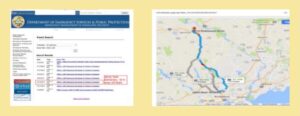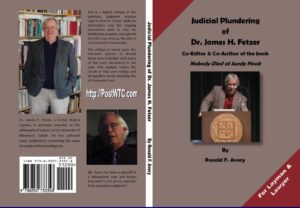
Jim Fetzer, Princeton in the Nation’s Service, Class of ’62 Style
Jim Fetzer ’62
I do not have any interest in involving the Class of 1962 Lecture Series in your work. —Thomas Dunn ’62 (19 October 2024)
On 13 October 2024, I received the following announcement from Thomas Dunn regarding the Princeton Class of ’62 SCHOLARS LECTURE SERIES: DAVID THORBURN, OCTOBER 22, 2024 AT 4 P.M. EASTERN. Having known David, it sounded like a great idea to me:
|
Jim Fetzer ’62, “What’s Wrong with Conspiracy Theories?”
Our classmate, Jim, graduated magna cum laude in philosophy when Princeton ranked #1 in the world in math, physics and philosophy. Commissioned as a 2nd Lieutenant at graduation, he resigned his commission as a Captain, USMC, in 1966, to enter graduate school in the history and philosophy of science at Indiana, following the recommendation of his thesis advisor, Carl G. Hempel. His first appointment at Kentucky was followed by visiting appointments at Virginia (twice), Cincinnati, North Carolina at Chapel Hill, New College of Florida (then of the University of South Florida) and the Duluth Campus of the University of Minnesota, where he retired in 2006 as Distinguished McKnight University Professor Emeritus.
Jim has published 24+ books in the philosophy of science and on the theoretical foundations of computer science, AI, cognitive science, and evolution and mentality. His first paper in computer science and AI, “Program Verification: The Very Idea” (1988), ignited an international debate over the role of mathematics in guaranteeing what a computer will do when it executes a program. He founded the international journal, MINDS AND MACHINES, and the international book library, STUDIES IN COGNITIVE SYSTEMS. He has received many honors and awards, including entries in Who’s Who in America (2001) and Who’s Who in the World (2001)
Since 1992, he has pioneered collaborative research on some of the most complex and controversial events of our time, including on JFK and 9/11, on which he has lectured in Athens, Buenos Aires, London, Cambridge, Yale and Harvard. Six of his 12+ books in this area have been banned by amazon.com. Here he explains how Hempel’s work on scientific theories applies to “conspiracy theories“, which every American needs to understand, because we are being played in ways that confirm Voltaire’s observation that “History is a pack of lies the living play upon the dead”. Jim believes the American people are entitled to the truth about their own history.
Jim

Tom,
Could you fill me in on my being blackballed for our lecture series? I am among the leading experts on Hempel, having edited two volumes for Oxford UP and authored the Stanford Encyclopedia of Philosophy entry on “Hempel, Carl”. I am also one of the three leading experts on false flags and conspiracies (along with Nicholas Kollerstrom and Ole Dammegard). I have been in personal contact with some of the participants in the Sandy Hook event, where we even have the FEMA manual for the exercise and its listing on the CT FEMA schedule. So I don’t get why I am being opposed. Someone who appears to have been played is the key, you have told me. But has he reviewed any of my work? the College of Complexes presentation? the book itself (which can be downloaded from my blog at FAKE NEWS: The Truth vs. Alex Jones? Check out my Motion to Open and Open Motion Exhibits (attached). I am baffled beyond words.
Jim

Tom,
Jim
Some of the kids actually sang at the Super Bowl following the event. Among them was
Please do not contact me again.
I do not have any interest in involving the Class of 1962 Lecture Series in your work.Tom
Ronald F. Avery
Architect1933 Montclair
Seguin, Texas 7815510/15/24
Thomas W. Dunn Chairman
The 1962 Scholars Lecture Series 1962 Princeton AlumniRe: Reconsideration of Dr. James H. Fetzer’s request to make a presentation titled “What’s Wrong with Conspiracy Theories?” at the 1962 Scholars Lecture Series.
Mr. Dunn,
I was asked by Dr. Fetzer to send you my recommendation for reconsideration based upon the information I know about a lawsuit he has been in since 2018. I am glad and honored to do so. I have written the only book about his treatment in the Wisconsin court system and his discoveries concerning how the US Supreme Court dispenses with the guaranteed rights of the US Constitution. The title of my book is Judicial Plundering of Dr. James H. Fetzer, Co-Editor & Co-Author of Nobody Died at Sandy Hook.
My book is not about the merit or weight of any of the evidence put forth by Dr. Fetzer, the Defendant, or the Plaintiff, regarding Sandy Hook. But rather my book is an analysis of the unsound summary judgment methodology used to find Dr. Fetzer liable for defamation and the perversion of law used to take his book to remove it from public access and continually plunder Dr. Fetzer and his wife, who isn’t involved in the lawsuit.
It is my informed opinion that this lawsuit displays the most extreme violation of judicial principles on every issue involved and at every level of review, which is a disgrace to the condition of modern law practice in America. Obviously, this condition would lead anyone to ask the question; why all this perversion of law regarding Dr. Fetzer and his book, Nobody Died at Sandy Hook. I am naturally led to suspect that it is to send a message to all Americans to never challenge the Mass Media Cartel narrative, no matter what it is or how false it might be. I think Dr. Fetzer’s topic, “What’s Wrong with Conspiracy Theories,” and the power of the mass media cartel over the court system in America would tie in very well with David Thorburn’s “Story Machine: American TV in the Network Era and Beyond,” as the cartel machinery is in place to adjudicate reality out of fiction regardless of the true facts of any event. What a fortunate possibility for this lecture series to host a living example of a victim of the vicious “Story Machine” in Dr. Fetzer! This potential gives new meaning to the term “network” when the judicial system adjudicates the mass media cartel’s narrative into reality regardless of proof and without a jury to weigh and find the facts.
Please allow me only a moment more of your time to substantiate what I have said regarding the plundering of Dr. Fetzer with just one of many examples in my book. A summary judgment is a judicial procedure used to apply the law to an issue when both the parties agree to the facts. A summary judgment must have two functions: first, to bypass an unnecessary jury when the facts are agreed to by the parties; and second, to protect the right of trial by jury of the nonmovant who is at risk of losing that right. Why have a jury when the parties agree to the facts? The judge can safely apply the law to the facts agreed to by the parties. Therefore, the judge cannot weigh evidence submitted by the parties in support of their facts but rather only look for agreement to the facts. If the judge finds disagreement supported by evidence they must deny the motion for summary judgment. Next, the motion for summary judgment must protect the right of trial by jury of the nonmovant. Hence, the judge must accept all the evidence favorable to the nonmovant as true and indulge every reasonable inference that can be drawn from that evidence. And further, any question must be resolved in favor of the nonmovant. The reason for this is, again, to protect the right to a trial by jury of the one at risk of losing it. There is no guaranteed right to a summary judgment but there is a guaranteed right to a trial by jury.
Dr. Fetzer was the nonmovant or one at risk of losing his right to a trial by jury and all evidence favorable to the movant was taken as true and all questions resolved in the movant’s favor, the wrong party! Had the motion for summary judgment been properly denied, both Dr. Fetzer and the Plaintiff could have proceeded to a trial by jury and neither party would have been injured. But instead, Dr. Fetzer was found liable for defamation when the two parties did not agree on anything and both submitted evidence supporting their allegation of facts.
To my astonishment, I discovered that this unsound summary judgment methodology used by the judge in Dr. Fetzer’s case is the standard throughout Wisconsin and hence was affirmed by the Wisconsin appellate and supreme courts. And even more shocking, I discovered in this case that the 7ᵗʰ Amendment (right to trial by jury in common law matters) in the US Constitution does not apply to state courts according to the US Supreme Court in defiance of simple logic which I explain in my book that you will receive shortly, if you kindly give Dr. Fetzer your physical mailing address.
One final note, it is apparent that very powerful entities in our nation are eager to disarm the American people against the law of the land making them vulnerable to abject tyranny and they have spent millions of dollars to accomplish that goal. Would it be so unwarranted to consider that televised street theater could be used to obtain such a wicked goal without actually harming anyone, at least immediately?
Thank you very much for your time.
Sincerely,
Ronald F. Avery

Now I do not know which, if any, of these submissions (and there were more) Thomas Dunn may have read. I can only conclude that his mind was made up and he didn’t want to be bothered with facts. It would not have made any difference. What we have found, alas, could today perhaps best be called Princeton in the Nation’s Service, Class of ’62 Style!
Jim Fetzer, Ph.D., a former Marine Corps officer, is McKnight Professor Emeritus on the Duluth Campus of the University of Minnesota and author/editor of 40 books in philosophy and on “false flags” and conspiracies.

No comments:
Post a Comment